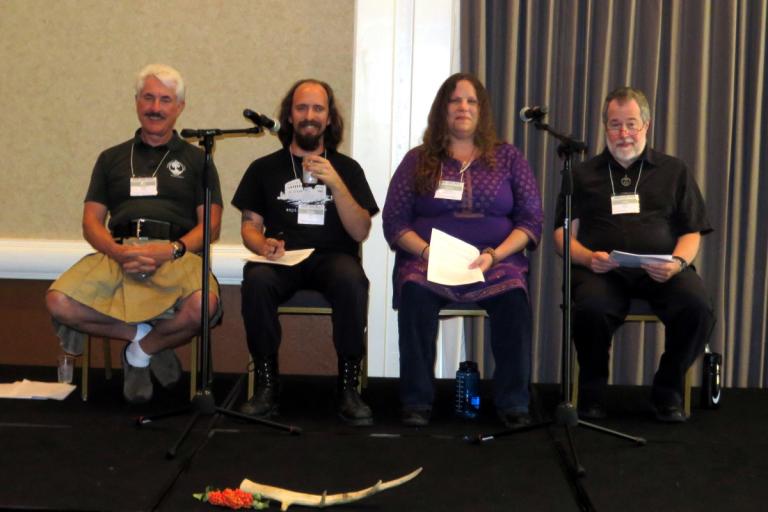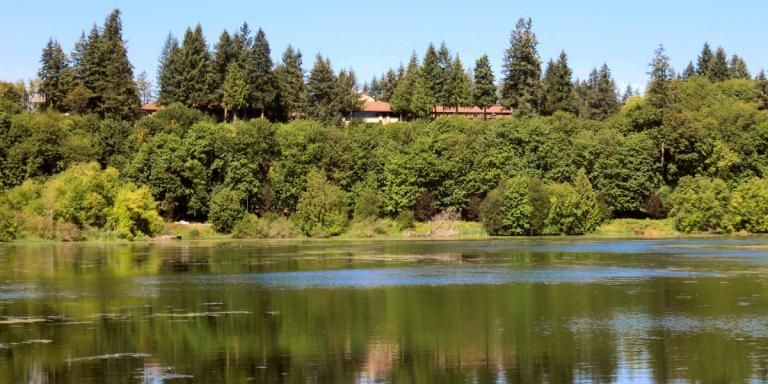My blog posts on conferences and retreats usually take one of two forms. Sometimes I play newspaper reporter and recap the event. Other times I write about my own experiences: who I saw, what I did, and how I felt about it all. But for Many Gods West 2016, I think what most people want to know is how it compared to last year’s conference.
First, though, I want to do one paragraph of reporting for the benefit of those who haven’t been to either event.
Many Gods West is a three day conference in Olympia Washington, held by and for polytheists. It includes rituals, workshops, panel discussions, and the all-important conversations in the lobby, bar, and individual rooms. Topics include pretty much anything of interest to polytheists, from theology to folklore to politics to football (that would be me and Jason Mankey). Niki Whiting has served as chief organizer both years.
So, how did this year’s MGW compare to last year’s? The facilities were much nicer. Last year’s conference was held at the Governor Hotel. It had a great location and not much else. This year we were at the Hotel RL. Meeting rooms were what I’d expect at a small convention hotel, the surroundings were beautiful, and the air conditioners worked. Not that we needed them. Temperatures were about 20 degrees cooler this time. The only downside was no food within walking distance except for the hotel restaurant.

The rituals (the ones I attended, anyway) were at least as good as last year’s, although they were different. Gwion and Phoenix’s Rhiannon Devotional told the story of Rhiannon, asked participants to identify with Her, and made offerings to Her. Jason and Ari Mankey’s Dionysus Ritual introduced people to this ever-changing deity and had even me approaching ecstasy. And the Ekklesía Antínoou’s River Gods West ritual honored both Antinous and the local rivers.
The informal conversations were excellent. There was the bar Friday night, one of our rooms Saturday night (that ended up being bigger than I had planned, but it was still great), and the lobby multiple times. I’ve got a long list of stuff to blog about coming out of those conversations.

There were two significant differences between this year’s conference and last year’s. MGW 2015 had an unstated but very clear theme of devotion. It started with a devotional opening ritual and was explicitly expressed in Morpheus Ravenna’s keynote address on the agency and sovereignty of the Gods. That theme was echoed in numerous presentations, in the rituals, and in the informal conversations.
MGW 2016 had an unstated but very clear theme of folk practice and magic. As with last year, it started with the opening ritual but it was most evident in the workshops. Every workshop I attended was polytheist: it affirmed the religious regard for many real Gods, in practice if not by positive affirmation (and that’s a good thing – requiring presenters to positively affirm anything is the beginning of a mandatory creed, which would be a very bad thing). But in the workshops I attended, the overwhelming emphasis was on what we can learn from historical sources and on how we can use what we learn to improve our lives. There’s absolutely nothing wrong with that and it was clear that’s important to many people. But it’s not the same thing as exploring the depths of devotional relationships with the Gods.
The other significant difference was the absence of many of the “big names” in the contemporary polytheist movement: the prominent authors, bloggers, scholars, and priests who are driving and shaping much of the depth of contemporary polytheism. There were many reasons why so many of them weren’t there: scheduling conflicts, financial limitations (just getting to Olympia is expensive, and then there’s the hotel and restaurant expenses), and the ordinary complexities of life. But several prominent polytheists actively – and loudly – chose not to be there.
I coordinated the plenary session on Building Polytheist Community, which meant I got to give myself the last word. To conclude the panel, I told a brief story that made the point “decisions are made by those who show up.” And in the context of this conference, “communities are built by those who show up.” Our many different approaches to polytheism are equally valid – if it affirms the religious regard for many real Gods, then it’s polytheism. But not every version and variation of polytheism is equally helpful: they don’t all do an equally good job of facilitating deep understanding of the Gods, relationships with Them, and the embodiment and promotion of Their virtues and values.
Clearly, some people like a magical and folkloric approach to polytheism rather than a devotional approach. Is that because it’s objectively better, because it’s better for them, or because it’s all they know? I suspect there are as many answers to that question as there are people who choose the magical and folkloric approach. And to be honest, I like magic and folklore in my polytheism. I just don’t put them ahead of my devotional practices.
The people who prefer a magical and folkloric approach to polytheism showed up. While those of us who prefer a devotional approach were represented – particularly in the rituals – many of our most informed and most articulate priests, scholars, and writers were not there and thus did not participate.
The polytheist movement is being built in many ways: in our private practices, in our local groups, and in our books and on-line discussions. Face to face conversations are an important part of this community building, and if a key part of the movement chooses not to participate, their voices will be diminished.
A couple of prominent polytheist bloggers warned about the risks of miasma for those in attendance. It became a running joke among those of us who were there. This was one of the most drama-free Pagan and/or polytheist gatherings I’ve ever attended. Some of the credit goes to the warders, who did an excellent job of creating a welcoming environment and keeping troublesome spirits at bay. More credit goes to the participants, who expressed their thoughts and concerns in a respectful manner.
Yes, I know drama and miasma are two different things. But they often go together, with the presence of one leading directly to the other in a vicious circle of egotism, unvirtuous actions, and impurities that separate us from our Gods and ancestors. If numerous participants begin suffering disconnections and related complications, then the prophets of miasma may yet be proven right. But for now, their concerns appear to have been overblown. Or perhaps, the warnings they received were intended only for themselves.
So, what of 2017? Chief organizer Niki Whiting has stepped down and Syren Nagakyrie (who carried much of this year’s workload) has stepped up to replace her. Syren and the rest of the organizing committee need some time to review this year’s conference before they try to figure out when and where – and if – next year’s Many Gods West will be held.
Regardless of what they decide, the polytheist movement needs more face to face interaction. It needs its most educated and experienced scholars, priests, and practitioners to participate in as many events as possible. Everyone need not attend every event (I certainly can’t), but we need to pick one or two events each year and gather for them, to help and support each other and to advocate for the varieties of polytheism we find most helpful.
Because communities are built by those who show up.

















